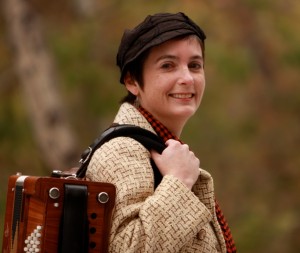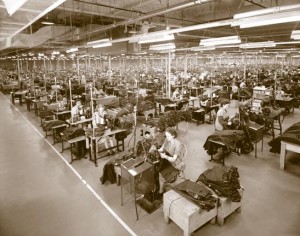MUSIC: Almost too much inspiration in new Maria Dunn album
 For a good old fashioned socially-conscious folk singer like Maria Dunn, you couldn’t ask for a richer topic than Edmonton’s famed GWG clothing factory.
For a good old fashioned socially-conscious folk singer like Maria Dunn, you couldn’t ask for a richer topic than Edmonton’s famed GWG clothing factory.
It has everything: Labour unions, local history, the immigrant experience, women’s rights and – since the factory closed seven years ago – another illustration of the drawbacks of corporate globalization. Almost too much material, really.
“It’s complicated,” admits Dunn, who releases her new concept album “Piece by Piece” with a show Thursday at Festival Place. The Shannon Johnson-produced record is an extension of a multi-media show Dunn was asked to be part of several years ago, called “GWG: Piece by Piece” that centred around interviews with current and former employees of the local jeans factory, which operated from 1911 until 2004. This story has so many levels that Dunn’s songwriting serves more to report than to comment.
She says, “I have a song called ‘Immigrant Dreams’ that uses the phrase, ‘some say it’s a sweatshop,’ but for the most part it was a pretty decent place to work. What (collaborator Don Bouzek) and I tried to do – with (U of A historian) Catherine Cole – during the interviews is reserve our judgement and just listen to what they had to tell us. Yeah, it was a dusty, hot, unpleasant workplace in the 1940s, but the woman who told us that was an Italian immigrant and she goes on to say, ‘it was my first job with my first pay packet in Canada, and it was huge for my feeling of self esteem and independence.’
“I feel like I was trying to listen to what the women were telling me in all its complexity and put aside all my preconceived notions. It’s hard to look back and even think what they were.”
Dunn winds up taking a stand on one issue: It sucks that a profitable clothing factory that employed hundreds of women was closed because of greed. As has happened countless times in manufacturing industry across North America, the parent company Levi Strauss decided GWG Edmonton wasn’t profitable enough, shut it down and outsourced the work to third world countries.
“I would love to say that it’s great,” Dunn says, “that the people there need those jobs, but it’s not good that they have start from scratch and fight to bring in decent working conditions and unions and reasonable wages. I lament the race to the bottom that has taken so much of our manufacturing industry out of North America.”
Dunn says it’s an issue of economic justice – both here and abroad.
She goes on, “It’s about people having a living wage, so that they’re not scrambling with many part time jobs, and jobs that have no benefits, especially when you have companies like Levi Strauss where they’re paying their CEO $20 million when they shut the factory down. And the factory was making a profit. I do have problem with a lack of commitment that multinational corporations have to the North American communities.”
Yes, lots of material here.
It’s especially challenging from someone who’s built a reputation for simplicity in both songwriting and production. Little subtle touches help tell the story on “Piece by Piece,” such as Indian sitar and tabla fused into the traditional folk songs – acknowledging two “eloquent” former GWG employees who were from South Asia. In contrast to the downbeat album opener “I Cannot Tell You (The Whole Story)” – which admits off the top it’s a daunting topic – the closing tune is a jaunty number called “Farewell,” inspired by a song sung by the Indian supervisor on the last night working in the GWG factory. The result has an almost “antique” sound.
“I was very conscious of trying to represent some of the different countries of origin of the women who were interviewed,” Dunn says. “The stories of the immigrants are timeless, people working hard to establish themselves in a new place, and I want the music to have more of that feel, too. And I love the sound of acoustic instruments, I love the sparse sounds.”
It rings true on this recording. Throw “Piece by Piece” on a scratchy wax cylinder and it could pass for a vintage Folkways recording, never mind the sitars.












